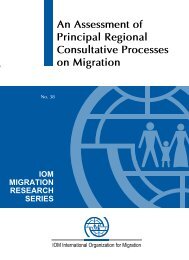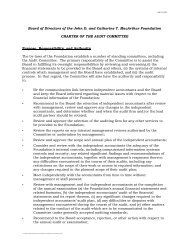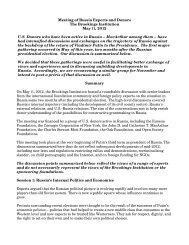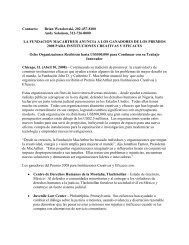A Global Compact on Learning - Brookings Institution
A Global Compact on Learning - Brookings Institution
A Global Compact on Learning - Brookings Institution
Create successful ePaper yourself
Turn your PDF publications into a flip-book with our unique Google optimized e-Paper software.
to manage the book banks, and provides a curriculum<br />
to c<strong>on</strong>duct reading awareness workshops<br />
for parents. After <strong>on</strong>e year, students dem<strong>on</strong>strated<br />
progress in letter identificati<strong>on</strong> (Nepal), oral reading<br />
fluency (Nepal and Malawi), and comprehending<br />
c<strong>on</strong>nected text (Malawi), as compared with c<strong>on</strong>trol<br />
schools that started with similar scores. 136 Other examples<br />
include the use of e-readers that download<br />
reading materials so that children can have access to<br />
new reading materials, often at a lower cost. Some<br />
e-readers, such as those used by Worldreader.org’s<br />
iRead pilot in Ghana, operate <strong>on</strong> the mobile ph<strong>on</strong>e<br />
networks that are growing rapidly worldwide and<br />
require low-levels of energy c<strong>on</strong>sumpti<strong>on</strong>. 137 Pilots<br />
have shown, however, that getting technology into<br />
schools al<strong>on</strong>e is not enough; teachers and students<br />
need to be trained and supported to ensure that the<br />
particular technology is being used as intended.<br />
There is still much learning needed when it comes<br />
to the use of technology to deliver high-quality and<br />
cost-effective educati<strong>on</strong>.<br />
Box 3.3. Building a Lifel<strong>on</strong>g Habit of Reading<br />
A key comp<strong>on</strong>ent of increasing literacy is ensuring<br />
that children have access to age-appropriate<br />
and relevant reading material. The Room<br />
to Read initiative has built 11,000 libraries in<br />
nine developing countries to give children fun<br />
and engaging reading materials and encourage<br />
reading. The presence of school libraries, specifically<br />
with reading material in the language<br />
of instructi<strong>on</strong>, has been shown to significantly<br />
increase the time children spend reading. For<br />
example, Room to Read found that in Zambia<br />
students were 37 percent more likely to read silently<br />
when they had access to a library. Furthermore,<br />
in Nepal, students with access to a library<br />
were 42 percent more likely to read for leisure at<br />
school and 86 percent more likely at home. Similar<br />
results were seen in Room to Read programs<br />
in Laos, stressing the importance of libraries and<br />
relevant reading material to students’ success.<br />
Sources: Room to Read website (www.roomtoread.org); Juarez &<br />
Associates Inc., Reading Room Cross-Nati<strong>on</strong>al Evaluati<strong>on</strong>: Year 1:<br />
Findings from Zambia, Nepal, and Laos. San Francisco: Room to Read,<br />
2009.<br />
Strategy 2B: Provide Mother-T<strong>on</strong>gue-<br />
Based Multilingual Educati<strong>on</strong> in the Lower<br />
Primary Grades<br />
Fifty percent of the world’s out-of-school children<br />
live in communities where the language of instructi<strong>on</strong><br />
in school is rarely, if ever, used at home. 138 The<br />
language of instructi<strong>on</strong> obviously has profound effects<br />
<strong>on</strong> children’s ability to access and learn effectively<br />
in school. Research indicates that having a<br />
str<strong>on</strong>g foundati<strong>on</strong> in a first language, especially during<br />
the early years of school, is crucial to a child’s educati<strong>on</strong>al<br />
success. 139 Using a language of instructi<strong>on</strong><br />
that children do not understand leads to increased<br />
repetiti<strong>on</strong> and dropout rates and poor educati<strong>on</strong>al<br />
achievement for those who stay in school. 140 In <strong>on</strong>e<br />
study, analysis of data from twenty-two developing<br />
countries and 160 language groups revealed<br />
that children who had access to instructi<strong>on</strong> in their<br />
mother t<strong>on</strong>gue were significantly more likely to be<br />
enrolled and attending school. C<strong>on</strong>versely, a lack of<br />
educati<strong>on</strong> in a child’s first language was a significant<br />
reas<strong>on</strong> for children dropping out. 141<br />
Children aged five to six years have, <strong>on</strong> average, a<br />
working vocabulary of 2,500 to 5,000 words by the<br />
time they enter the classroom. 142 This knowledge is<br />
essentially wasted when they are unable to use and<br />
build up<strong>on</strong> their skills. Rather than impeding children’s<br />
ability to learn the official language, studies<br />
show that schooling in a child’s mother t<strong>on</strong>gue is<br />
a str<strong>on</strong>g predictor of achievement in a sec<strong>on</strong>d language.<br />
143 For example, children learning under the<br />
“mother-t<strong>on</strong>gue-based multilingual educati<strong>on</strong>” approach<br />
in Lubuagan, the Philippines (in English,<br />
Filipino, and Lubuagan), outperformed their peers<br />
who learned in English and Filipino not <strong>on</strong>ly in<br />
their mother t<strong>on</strong>gue but also in English and Filipino.<br />
144 There is also growing evidence that early bilingualism<br />
can provide children with benefits that go<br />
bey<strong>on</strong>d knowing more than <strong>on</strong>e language, including<br />
cognitive flexibility and the ability to transfer knowledge<br />
across languages earlier and better than their<br />
m<strong>on</strong>olingual peers. 145 Additi<strong>on</strong>ally, the use of home<br />
language in school can increase parents’ participati<strong>on</strong><br />
in their children’s educati<strong>on</strong>. Mother-t<strong>on</strong>guebased<br />
multilingual educati<strong>on</strong> may be even more<br />
A <str<strong>on</strong>g>Global</str<strong>on</strong>g> Compa c t <strong>on</strong> <strong>Learning</strong>: Taking Acti<strong>on</strong> <strong>on</strong> Educat i o n in Developing Countries<br />
C e n t e r for Universal Educat i o n at <strong>Brookings</strong><br />
27






